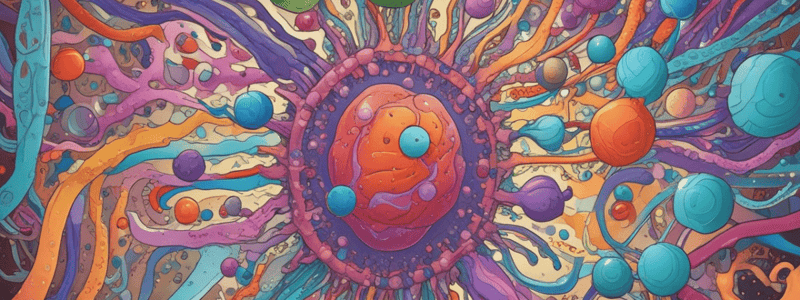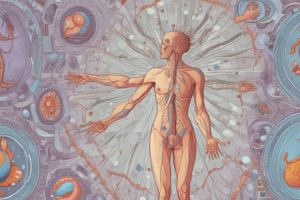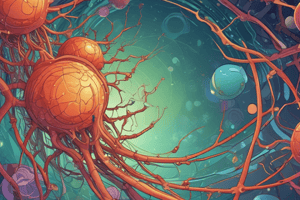Podcast
Questions and Answers
What is the primary role of leukocytes?
What is the primary role of leukocytes?
- To produce and educate immune cells
- To function as a physical barrier
- To defend the body against microorganisms that cause infection and remove debris (correct)
- To screen the lymph and bloodstream
Which type of leukocyte has an irregular, multilobulated nucleus?
Which type of leukocyte has an irregular, multilobulated nucleus?
- Eosinophils
- Neutrophils
- Monocytes
- Basophils (correct)
What is the function of the spleen in the immune system?
What is the function of the spleen in the immune system?
- To screen the bloodstream (correct)
- To function as a physical barrier
- To produce immune cells
- To screen the lymph
What is the primary difference between granulocytes and agranulocytes?
What is the primary difference between granulocytes and agranulocytes?
What is the role of the thymus in the immune system?
What is the role of the thymus in the immune system?
What is the function of lymph nodes in the immune system?
What is the function of lymph nodes in the immune system?
What is the primary function of cytotoxic T cells in adaptive immunity?
What is the primary function of cytotoxic T cells in adaptive immunity?
Where do T cells differentiate and mature in the adaptive immune system?
Where do T cells differentiate and mature in the adaptive immune system?
What is the main role of humoral immunity in adaptive immunity?
What is the main role of humoral immunity in adaptive immunity?
How do lymphocytes ensure self-tolerance during their development?
How do lymphocytes ensure self-tolerance during their development?
What is the primary function of helper T cells in adaptive immunity?
What is the primary function of helper T cells in adaptive immunity?
What is the site where lymphocytes are exposed to 'non-self' antigens and become activated?
What is the site where lymphocytes are exposed to 'non-self' antigens and become activated?
What is the primary function of neutrophils in the innate immune response?
What is the primary function of neutrophils in the innate immune response?
Which of the following cell types is responsible for antibody creation in the adaptive immune response?
Which of the following cell types is responsible for antibody creation in the adaptive immune response?
What is the role of pattern recognition receptors (PRRs) on the surface of innate immune cells?
What is the role of pattern recognition receptors (PRRs) on the surface of innate immune cells?
What is the primary function of the complement system in the immune response?
What is the primary function of the complement system in the immune response?
What is the role of cytokines in the immune response?
What is the role of cytokines in the immune response?
Which of the following is an example of a biochemical barrier in the innate immune response?
Which of the following is an example of a biochemical barrier in the innate immune response?
What is the primary function of dendritic cells in the immune response?
What is the primary function of dendritic cells in the immune response?
What is the role of histamine in the immune response?
What is the role of histamine in the immune response?
What is the primary function of eosinophils in the immune response?
What is the primary function of eosinophils in the immune response?
What is the role of MHC molecules in the immune response?
What is the role of MHC molecules in the immune response?
What is the primary function of cytotoxic T-cells?
What is the primary function of cytotoxic T-cells?
What is required for the activation of helper T-cells?
What is required for the activation of helper T-cells?
What is the primary role of natural killer cells?
What is the primary role of natural killer cells?
What is the primary function of immune memory?
What is the primary function of immune memory?
What is the primary difference between the primary and secondary immune responses?
What is the primary difference between the primary and secondary immune responses?
What is the primary function of memory B-cells?
What is the primary function of memory B-cells?
What is the primary type of antibody produced during the primary immune response?
What is the primary type of antibody produced during the primary immune response?
What is the primary characteristic of passive immunity?
What is the primary characteristic of passive immunity?
What is the primary role of helper T-cells in the immune response?
What is the primary role of helper T-cells in the immune response?
What is the primary difference between IgM and IgG antibodies?
What is the primary difference between IgM and IgG antibodies?
What is the primary function of antibodies produced by B-cells?
What is the primary function of antibodies produced by B-cells?
Which type of T-cells is responsible for attacking and destroying infected cells or enemy cells?
Which type of T-cells is responsible for attacking and destroying infected cells or enemy cells?
What is the role of IgM antibodies in the adaptive immune response?
What is the role of IgM antibodies in the adaptive immune response?
What is the primary function of Class I MHC molecules?
What is the primary function of Class I MHC molecules?
Which type of cells are known as professional antigen-presenting cells (APCs)?
Which type of cells are known as professional antigen-presenting cells (APCs)?
What is the primary difference between IgG and IgM antibodies?
What is the primary difference between IgG and IgM antibodies?
What is the role of IgE antibodies in the immune response?
What is the role of IgE antibodies in the immune response?
What is the primary function of the variable region of an antibody?
What is the primary function of the variable region of an antibody?
Which type of T-cells is responsible for amplifying T-cell and B-cell activity against a specific antigen?
Which type of T-cells is responsible for amplifying T-cell and B-cell activity against a specific antigen?
What is the primary function of MHC molecules in the immune response?
What is the primary function of MHC molecules in the immune response?
What is the primary function of PRRs in the immune response?
What is the primary function of PRRs in the immune response?
During an acute inflammatory response, what occurs in the affected area?
During an acute inflammatory response, what occurs in the affected area?
What is the role of lysosomes in phagocytosis?
What is the role of lysosomes in phagocytosis?
What is the primary function of the complement system?
What is the primary function of the complement system?
What is the primary characteristic of adaptive immunity?
What is the primary characteristic of adaptive immunity?
What is the final phase of inflammation?
What is the final phase of inflammation?
What is the primary function of neutrophils during inflammation?
What is the primary function of neutrophils during inflammation?
What is the role of marginating neutrophils?
What is the role of marginating neutrophils?
What is the consequence of taking steroids on WBC count?
What is the consequence of taking steroids on WBC count?
What is the primary function of plasma protein synthesis during inflammation?
What is the primary function of plasma protein synthesis during inflammation?
What is the primary function of vaccination?
What is the primary function of vaccination?
What is the primary difference between active and passive immunity?
What is the primary difference between active and passive immunity?
What is the function of the Hepatitis B surface antigen in the Hepatitis B vaccine?
What is the function of the Hepatitis B surface antigen in the Hepatitis B vaccine?
What is the primary function of IgM antibodies in the immune response?
What is the primary function of IgM antibodies in the immune response?
What is the primary reason why booster doses are needed?
What is the primary reason why booster doses are needed?
What is the primary difference between IgM and IgG antibodies?
What is the primary difference between IgM and IgG antibodies?
What is the primary mechanism by which transfusion reactions occur?
What is the primary mechanism by which transfusion reactions occur?
What is the most common antigen responsible for Rh isoimmunization?
What is the most common antigen responsible for Rh isoimmunization?
What type of immune response do vaccines stimulate?
What type of immune response do vaccines stimulate?
What is the primary consequence of Rh isoimmunization in an Rh-negative mother carrying an Rh-positive fetus?
What is the primary consequence of Rh isoimmunization in an Rh-negative mother carrying an Rh-positive fetus?
What is the primary function of anti-HBs IgG antibodies in hepatitis B infection?
What is the primary function of anti-HBs IgG antibodies in hepatitis B infection?
What is the role of macrophages in transfusion reactions?
What is the role of macrophages in transfusion reactions?
What is the primary mechanism of immune tolerance development during fetal and early postnatal life?
What is the primary mechanism of immune tolerance development during fetal and early postnatal life?
What is the universal recipient blood type?
What is the universal recipient blood type?
What is the primary characteristic of autoimmune diseases?
What is the primary characteristic of autoimmune diseases?
What is the typical outcome of a transfusion reaction in a patient with type A blood receiving a transfusion of B blood?
What is the typical outcome of a transfusion reaction in a patient with type A blood receiving a transfusion of B blood?
What is the primary function of cytotoxic T cells in an autoimmune response?
What is the primary function of cytotoxic T cells in an autoimmune response?
What is the primary function of helper T cells in HIV infection?
What is the primary function of helper T cells in HIV infection?
What is the primary mechanism of HIV transmission to a new host?
What is the primary mechanism of HIV transmission to a new host?
What is the primary characteristic of transfusion reactions?
What is the primary characteristic of transfusion reactions?
What is the primary function of the immune system in autoimmune diseases?
What is the primary function of the immune system in autoimmune diseases?
What is the primary mechanism of immune tolerance in pregnancy?
What is the primary mechanism of immune tolerance in pregnancy?
Flashcards are hidden until you start studying
Study Notes
The Immune System
- Functions:
- Physical barrier
- Production and "education" of immune cells
- Defense against microorganisms and removal of debris
- Organs and cells involved:
- Bone marrow
- Thymus
- Spleen (screens bloodstream)
- Lymph nodes (screen lymph)
- Lymphoid organs (screen border regions)
- Leukocytes (classify into granulocytes and agranulocytes)
Cells of the Immune System
Leukocytes
- Defend the body against microorganisms and remove debris
- Classified according to structure:
- Granulocytes (many membrane-bound granules in cytoplasm)
- Neutrophils
- Eosinophils
- Basophils
- Agranulocytes (fewer granules in cytoplasm)
- Monocytes
- Macrophages
- Lymphocytes
- Granulocytes (many membrane-bound granules in cytoplasm)
Immune Response
Innate Immunity (Natural Immunity)
- First response to infection
- Early defense systems of the body:
- Epithelial barrier
- Inflammation
- Cells involved:
- Neutrophils
- Eosinophils
- Basophils
- Monocytes/macrophages
- Dendritic cells
Adaptive Immunity (Acquired Immunity)
- Second response to infection
- Long-term and highly effective immunity
- Cells involved:
- B cells (antibody creation)
- T cells (CD4+ and CD8+)
- Cytokines and chemokines (communication between cells)
Molecules of the Immune System
- Broad categories:
- Antigens (non-self molecules detected by the immune system)
- MHC (major histocompatibility complex) molecules (self proteins used to detect non-self molecules)
- Antibodies (effector molecules)
- Cytokines and chemokines (messenger molecules)
The Body's Lines of Defense
- Innate immunity:
- Physical barrier
- Mechanical barrier
- Biochemical barrier
- Normal microbiome
- Adaptive immunity:
- Specificity and memory
Inflammation
- Response to tissue injury or infection
- Cells involved:
- Macrophages
- Neutrophils
- Eosinophils
- Dendritic cells
- Functions:
- Prevent infection spread
- Promote healing
- Activate immune cells
Immune System Plasticity
- Ability of the immune system to undergo changes in response to a physiologic environment
- Adaptive immunity:
- Encounter
- Activation
- Antibody creation
- Attack
Lymphoid Tissue
- Primary lymphoid organs:
- Bone marrow
- Thymus
- Secondary lymphoid organs:
- Spleen
- Lymph nodes
- Tonsils
- Adenoids
- Appendix
- Peyer's patches
Lymphocyte Differentiation
- Starts in bone marrow with a pluripotent stem cell
- Further differentiates into:
- Myeloid stem cells
- Lymphoid stem cells
- T cells
- B cells
Adaptive Immunity Cell Functions
- B cells:
- Mature into plasma cells
- Produce antibodies
- T cells:
- Cytotoxic T cells (CD8+): kill infected cells
- Helper T cells (CD4+): regulate immune response
- Regulatory T cells: suppress or limit immune response
Antibodies
- Functions:
- Neutralize antigens
- Agglutinate antigens
- Opsonize antigens
- Activate complement cascade
- Enhance natural killer cell activity
- Five classes of antibodies:
- IgG
- IgM
- IgA
- IgE
- IgD
T Cells
- Functions:
- Find antigens presented on MHC molecules
- Attack and destroy infected cells
- Amplify immune response
- MHC molecules:
- Class I: present endogenous antigens
- Class II: present exogenous antigens
- Professional antigen-presenting cells (APCs): macrophages, dendritic cells, activated B cells, activated T cells, and thymus cells
- Non-professional APCs: all nucleated cells
Immunity
- Passive immunity has two forms: administration of synthetically produced antibodies and transfer of antibodies from mother to fetus or baby through the placenta (IgG) and breast milk (IgA)
- Passive immunity does not produce memory cells, so there is no long-term immunity
Active Immunity
- An immune response to a vaccine or pathogen in an individual
- Confers immunity due to the production of memory cells
- Vaccination introduces a microorganism or its antigens in a form not expected to cause disease, inducing an immune response and production of memory cells
Immunologic Memory
- Immunization provides protection from infection due to controlled exposure to either killed or disabled pathogen
- Allows adaptive immune system to form antibodies and train memory B and T cells specific for pathogens
- If the vaccinated patient encounters the pathogen, previously formed antibodies and memory cells prevent disease by quickly neutralizing the pathogen
Hepatitis B Vaccine
- Uses surface protein (Hep B surface antigen or HBsAg)
- A vaccinated person creates antibodies to HBsAg – called Anti HBs
- IgM emerges first, followed by IgG
- Once IgG is established, the person is immune to Hep B – unless IgG titers go down, requiring a booster dose
Hep B Disease and Immunity
- Someone who has been infected with Hepatitis antigen will first make IgM to the HBcAg and HBsAg
- As they move into making IgG for these, immunity has developed
- Anti-HBs IgG is the last step towards completely eradicating a Hepatitis B infection
- Some people never make this, and thus become chronic carriers of hepatitis B
Immune Response
- Antigen gets past physical barriers and into lymphatics
- Antigen gets exposed to B cells and macrophages in the spleen or a lymph node
- Macrophages eat the invaders and present them to T cells using the MHC, releasing cytokines like IL-1 and TNF
- Helper T cells are activated and make IL-2, creating a giant colony of helper-T cells against the invader
- Helper T cells release B-cell-activating cytokines, causing B cells to proliferate and become either plasma cells or memory B cells
- Antibodies made by B cells opsonize the invader for ingestion, clump invaders together, and cover the invader's binding sites
Immune Tolerance
- Develops during fetal and early postnatal life due to clonal deletion or clonal inactivation
- Pregnant mothers have a dampened immune system to "tolerate" the "non-self" of the developing embryo
- Autoimmune diseases are caused by failure in development of self-tolerance
Autoimmunity
- An immune response by the host against the host, or inflammation in the absence of infection
- Cytotoxic T-cells may attack and kill healthy host cells
- Helper T cells may promote inflammation where none is needed
- B cells may produce antibodies that bind self structures
- Under normal conditions, self-reactive cells undergo apoptosis or are silenced
Immunodeficiency Diseases
- Result from weak or under-active immune systems
- Examples: SCID, Hodgkin's Disease, AIDS
- HIV affects helper T cells
- Human Immunodeficiency virus (HIV) is a retrovirus made of double-stranded RNA that targets cells expressing CD4 receptors (helper T cells, some macrophages, some monocytes)
Transfusion Reactions
- Definition: Illness caused when erythrocytes are destroyed during blood transfusion
- Key Facts: Erythrocytes do not have MHC proteins but have plasma membrane proteins and carbohydrates that can function as antigens
- Transfusion reactions happen when antibodies bind to these plasma membrane proteins/carbohydrates, recognizing them as "non-self"
- The RBC's are then engulfed/destroyed by macrophages, triggering the MHC Class II Helper T cell response
- The ABO system of carbohydrates is the most important for transfusion reactions
- Rh proteins are next most important
- O negative is the universal donor
- AB is the universal recipient
- If someone with type A blood is given a transfusion of B blood, a transfusion reaction occurs
- Symptoms of transfusion reaction include itchiness, hemolysis, allergy, and alloimmunization
Alloimmunization
- An immunologic disorder that occurs in an Rh- negative patient carrying an Rh- positive fetus
- Rh complex is made up of lots of antigens, including C, D, E, c, and e
- More than 90% of cases of Rh Isoimmunization are due to D antibodies
- Maternal immune system makes IgM and then IgG to Rh antigen
- Antibodies cross the placenta and cause hemolysis of fetal red blood cells
- Can lead to profound anemia, fetal hydrops, intrauterine fetal death, high bilirubin leading to neonatal kernicterus
Studying That Suits You
Use AI to generate personalized quizzes and flashcards to suit your learning preferences.




